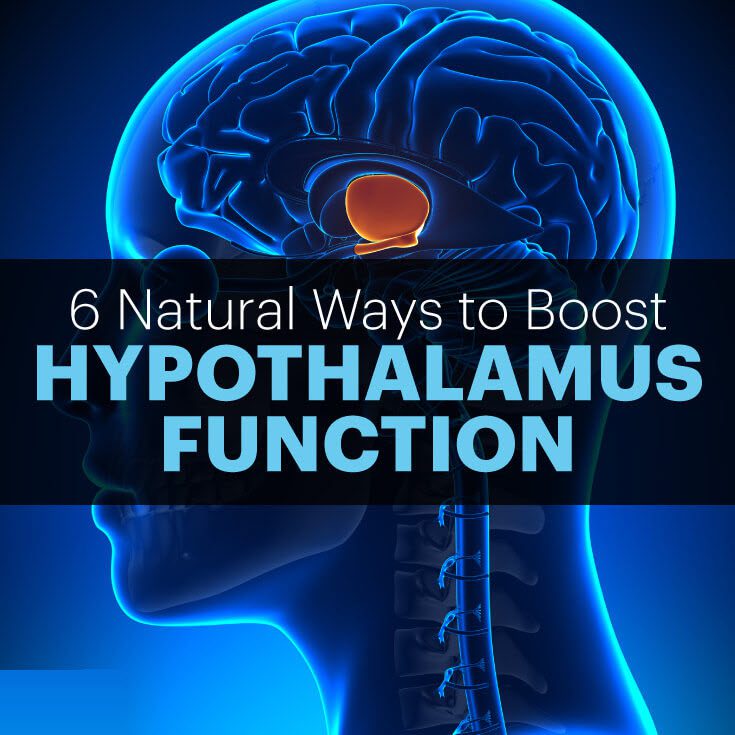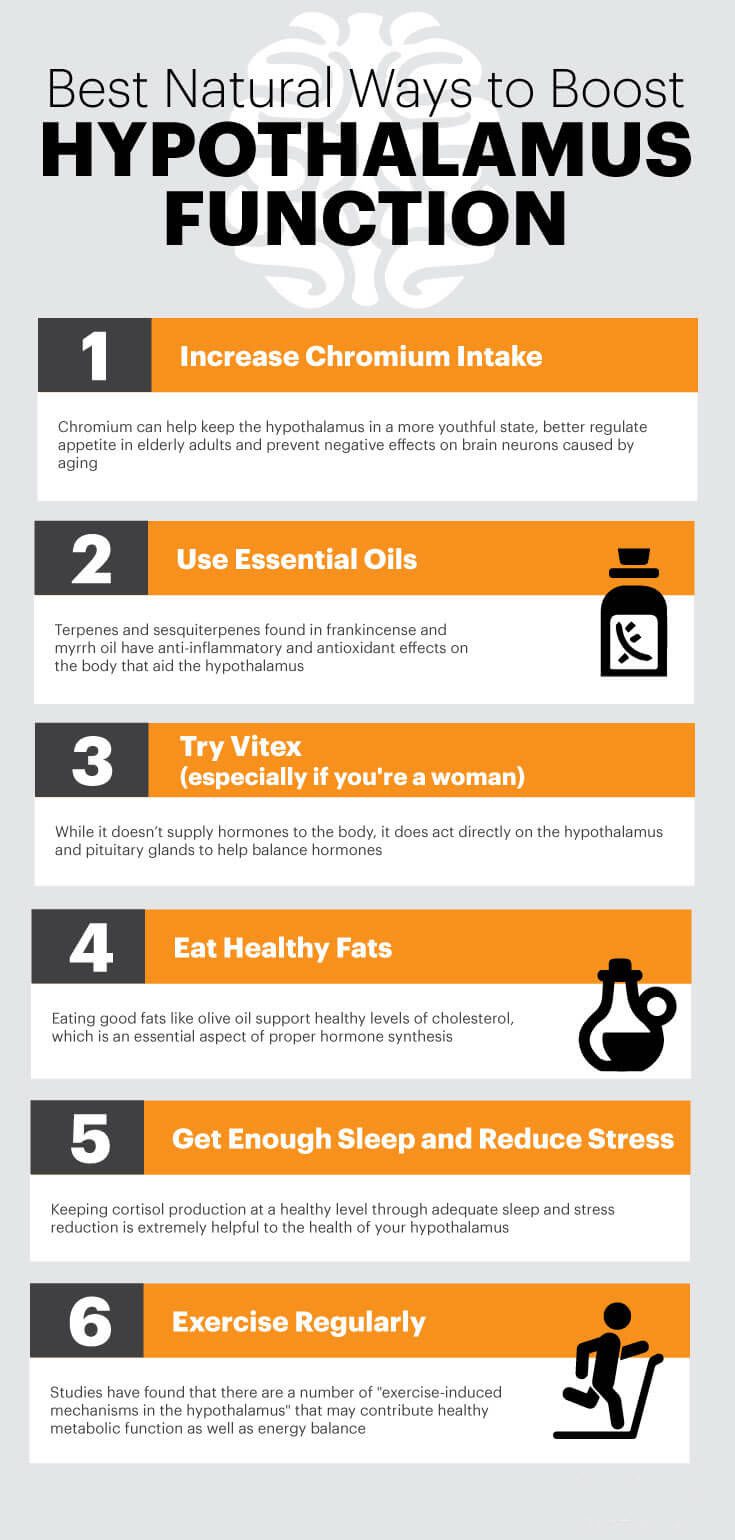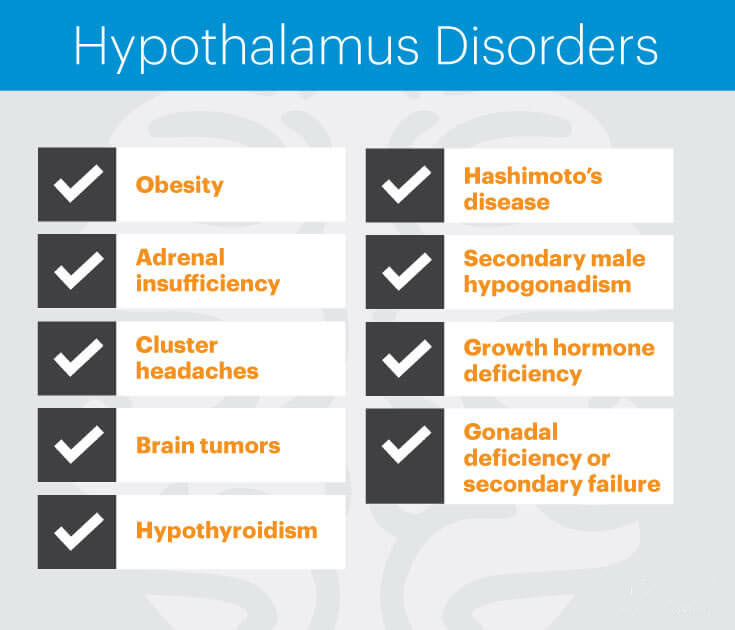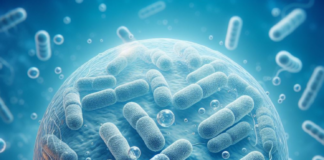
The hypothalamus is an essential part of the human brain and is often considered the “control center” for most hormones.
Its working relationship with the pituitary gland as well as the adrenal glands affects our nervous systems as well as our endocrine systems.
But what does the hypothalamus do precisely?
For starters, it plays a part in our calorie intake, weight regulation, and body heat.
I’m sure you’re starting to get the picture that, even if you weren’t already familiar with the hypothalamus function, it is essential to human existence.
The hypothalamus is located deep within the brain, just above the base of the skull.
Its primary general function is to regulate the homeostasis of our bodies.
In other words, it helps keep the human body in a constant, steady-state.
When the hypothalamus doesn’t function properly, this throws off the functioning of the pituitary gland.
But it doesn’t stop there because the pituitary gland controls the adrenal glands, ovaries, testes, and thyroid glands.
So when the hypothalamus function isn’t right, there are a lot of other things affected that are all vital to good health.
Recent research even shows that the hypothalamus controls many aspects of aging.
Studies give hope to the possibility that we may be able to change signaling within the hypothalamus to slow down the aging process and increase longevity.
Let’s take a look at exactly when and how the hypothalamus can affect our health and how we can naturally boost the function of this underrated gland.
Best Natural Ways to Boost Hypothalamus Function
1. Increase Chromium Intake
Chromium is a trace mineral needed by the body in small amounts for healthy functioning.
The hypothalamus is extremely important, a central part of the autonomic nervous system that helps controls body temperature, thirst, hunger, sleep, and emotional activity.
Studies have linked chromium with a healthier hypothalamus function.
Research suggests that it can help keep the hypothalamus in a more youthful state,
better regulate appetite in elderly adults, and prevent adverse effects on brain neurons caused by aging.
According to the USDA, below are 10 of the best food sources for obtaining more chromium naturally through your diet:
- Broccoli
- Potatoes
- Garlic
- Basil
- Grass-fed beef
- Oranges
- Turkey
- Green beans
- Apples
- Bananas
You may want to consider supplementing with chromium.
However, the benefits of taking chromium supplements are still somewhat controversial and questioned by some medical experts since studies to date show mixed results.
If you can, it’s best to get chromium from natural foods.
2. Use Essential Oils
Essential oils of frankincense and myrrh don’t just have extremely lengthy histories of use dating back to biblical times — they’ve also been shown to improve brain health.
Two primary active compounds called terpenes and sesquiterpenes are found in both frankincense and myrrh oil.
Both of these compounds have anti-inflammatory and antioxidant effects on the body.
Sesquiterpenes can cross the blood-brain barrier and stimulate the limbic system of the brain and other glands, promoting memory and releasing emotions.
Sesquiterpenes have been found to increase oxygen around receptor sites near the hypothalamus, pineal, and pituitary glands.
Sesquiterpenes also specifically affect our emotional center in the hypothalamus, helping us remain calm and balanced.
There are many ways to incorporate frankincense and myrrh into your daily life.
You can diffuse the essential oils, inhale them straight from the bottle, or you can mix them with a carrier oil like jojoba and apply the mixture directly to the skin.
You can try making Homemade Frankincense and Myrrh Lotion, which is an awesome way to easily incorporate both of these essential oils into your daily routine.
3. Try Vitex (Especially If You’re a Woman)
Vitex, also known as chaste tree berry, is an herbal supplement highly acclaimed for its ability to help balance female hormones.
The healing ability of chasteberry to positively affect hormonal health issues appears to be derived from dopaminergic compounds present in the herb. How exactly does vitex encourage hormonal balance?
While it doesn’t supply hormones to the body, it does act directly on the hypothalamus and pituitary glands.
For women, it increases luteinizing hormone, modulates prolactin, and aids in the inhibition of the release of follicle-stimulating hormone,
which all help balance out the ratio of progesterone to estrogen, slightly raising the levels of progesterone.
If you suffer from infertility and PCOS, vitex can be particularly helpful.
Vitex or chasteberry is available in many different forms in your local health store or online.
The dried, ripe chasteberry is used to prepare liquid extracts or solid extracts that are put into capsules and tablets.
If you’re not a fan of capsules or tablets, then the liquid extract is a great choice.
You can also easily find vitex in tea form on its own or combined with other herbs that promote hormonal balance. You can also order the dried berries and make your tincture at home.

4. Eat Healthy Fats
In addition to vitex, there are many other natural ways to balance your hormones and achieve better hypothalamus function.
Establishing hormonal balance in your body has a direct positive effect on the function of your hypothalamus as well as your pituitary gland.
One of the best ways to balance your hormones through your diet is to consume healthy fats regularly.
Cholesterol and other fats play a fundamental part in building cellular membranes and hormones.
Certain kinds of fats, including cholesterol, also act like antioxidants and precursors to some important brain-supporting molecules and neurotransmitters.
Some of my favorite sources of anti-inflammatory, healthy fats include olive oil, coconut oil, avocados, grass-fed butter, and wild-caught salmon.
Eating good fats like olive oil supports healthy levels of cholesterol, which is an essential aspect of proper hormone synthesis.
5. Get Enough Sleep and Reduce Stress
Sleep is also key to keeping our hormones in check. A lack of sleep, long-term use of corticosteroids, and chronic stress are three of the biggest contributors to high cortisol levels.
A report published in the Indian Journal of Endocrinology and Metabolism states that “Stress can lead to changes in the serum level of many hormones including glucocorticoids, catecholamines, growth hormone and prolactin.”
Cortisol is a glucocorticoid hormone synthesized from cholesterol by enzymes. At the right levels, it’s helpful, but when you have too much, it can cause problems.
Since the hypothalamus-pituitary-adrenal axis and cortisol regulate cortisol is the primary hormone responsible for the stress response,
keeping cortisol production at a healthy level through adequate sleep and stress reduction is extremely helpful to the health of your hypothalamus (as well as your pituitary and adrenal glands).
6. Exercise Regularly
Moderate exercise regularly is excellent for your hypothalamus as well as your entire body.
Several studies have previously found a gamma-amino-butyric acid deficiency in the hypothalamus of hypertensive animal subjects.
A study published in 2000 looked at the relationship between the hypothalamus, exercise, and high blood pressure in animal subjects.
In this study, the researchers found that regular exercise has a positive effect on both gene expression and neuronal activity in the hypothalamus.
Not surprisingly, they also found that regular exercise lowered blood pressure levels in hypertensive animals.
It appears that exercise not only boosts heart health, but also improves hypothalamus health, and improving both is likely to help lower blood pressure for humans as well as animals.
Studies have also found that there are several “exercise-induced mechanisms in the hypothalamus” that may contribute to healthy metabolic function as well as energy balance. (10)
What Is the Hypothalamus?
The hypothalamus is a small structure in your brain. That’s about the size of an almond.
If you’re familiar with brain anatomy, the hypothalamus is located underneath the thalamus, and it descends from the brain into the pituitary stalk, which connects to your pituitary gland.
The hypothalamus coordinates the activity of the autonomic nervous system. Also, it plays a significant role in the function of the endocrine system due to its complex relationship with the pituitary gland.
The hypothalamus contains specialized nuclei designed to do specific work, such as maintaining many basic physiological functions, including body temperature, blood pressure, fluid and electrolyte balance, and the regulation of digestion.
If all that sounds too medical or scientific, I can give you a more simple hypothalamus definition:
It’s a region of the brain that affects several things that are key to human health like thirst, hunger, body temperature, sleep, and emotions.
How exactly does the hypothalamus function in our bodies?
It links our endocrine and nervous systems together, and the pituitary gland (another important regulatory gland) receives signals from the hypothalamus.
Both nervous and chemical pathways connect the hypothalamus and pituitary gland, and the hypothalamus produces and secretes neurotransmitters,
neuropeptides along with several neurohormones that affect anterior pituitary gland function.
The hypothalamus also produces hormones (anti-diuretic hormone and oxytocin) that travel down through the pituitary stalk to the posterior lobe of the pituitary gland,
where these hormones are released directly into the bloodstream.
Other vital hormones produced in the hypothalamus include corticotropin-releasing hormone, dopamine, growth hormone-releasing hormone, somatostatin, gonadotropin-releasing hormone, and thyrotropin-releasing hormone.
The hypothalamus is also vital to proper thyroid function and health.
The primary hormones that are produced by the thyroid are called T4 and T3.
Their production depends on the hypothalamus, accurately sensing the need for more thyroid hormone in the bloodstream and signaling the pituitary gland to then release more.
The pituitary gland normally releases Thyroid-stimulating hormone in response to changing levels of thyroid hormones in the bloodstream, but if you have hypothyroidism or Hashimoto’s disease, this system fails.
There is either too little T4 being converted to T3, the hypothalamus is not signaling to the pituitary gland properly, or the pituitary gland is not releasing enough thyroid-stimulating hormone after it’s signaled to.
Overall, the hypothalamus produces hormones that control:
- Body temperature
- Heart rate
- Hunger
- Mood
- Release of hormones from many glands, especially the pituitary gland
- Sex drive
- Sleep
- Thirst
The hypothalamus also helps regulate appetite and weight, salt and water balance, emotions, growth, childbirth, and milk production.
As you can tell, the hypothalamus is essential to some truly pivotal life variables and events.
Hypothalamus Disorders
Surgery, traumatic brain injury, radiation, and tumors are the most common causes of hypothalamus malfunction. There are also several other possible roots of a hypothalamus disorder, including: (13)
- Malnutrition
- Infections and inflammation
- Head trauma
- Bleeding
- Eating disorders like anorexia and bulimia
- Genetic disorders that cause a bodily iron buildup
How can you know if you have something wrong with your hypothalamus?
Various symptoms are depending on the root cause. Still, some of the most common signs of unhealthy hypothalamus function include a slow heart rate, low body temperature, as well as increased appetite and rapid weight gain.
Extreme thirst and frequent urination may also be signs of a hypothalamus problem as well as diabetes insipidus.
Some disorders that are associated with hypothalamus malfunction include, but are not limited to:
Obesity
Multiple studies have linked hypothalamus malfunction with obesity, an extreme excess of body weight. This isn’t surprising since we know that the hypothalamus plays a huge role in metabolism and energy expenditure.
The term “hypothalamic obesity” describes intractable weight gain after damage to the hypothalamus.
Unfortunately, hypothalamic obesity can be a complication for some brain tumor survivors, especially if they received their diagnoses as children.
An estimated third of all craniopharyngioma survivors develop severe obesity after diagnosis and treatment.
Adrenal Insufficiency
Low adrenal function or adrenal insufficiency is associated with hypothalamus malfunction. The hypothalamus is a part of the hypothalamus-pituitary-adrenal axis and plays a significant part in adrenal insufficiency.
Under ideal circumstances, the hypothalamus sends the pituitary gland “releasing hormones” to control sex hormone production, thyroid, and adrenal functions.
The pituitary gland then has the job of communicating with the adrenal glands, sending it the stimulating hormone called adrenocorticotropin that’s meant to prompt adrenal hormone production.
Usually, the adrenals do their job, making proper levels of cortisol and other hormones, and the pituitary gland and hypothalamus get the message — but in people with adrenal insufficiency, all of the communication lines are thrown off.
Low adrenal function symptoms may include dizziness or weakness.

Cluster Headaches
Recent studies have shown that the hypothalamus is stimulated during a cluster headache attack.
A 2013 study conducted in China detected significant increases of functional correlation to the right hypothalamus in cluster headache patients during acute spontaneous cluster headache “in attack” periods in comparison to those during the “out of attack” periods.
Researchers concluded that cluster headache patients have dysfunction of brain function connectivity, mainly in brain regions that are related to pain processing.
Other health concerns associated with hypothalamic dysfunction include:
Hormonal changes affect the hypothalamus, which controls body temperature, and this leads to the common complaint of “hot flashes” reported by women going through menopause.
Also, if you’re a woman experiencing infertility, it may be due to polycystic ovarian syndrome, which is related to unhealthy hypothalamus function.
Precautions Regarding Hypothalamus Function
To determine if you have a problem with your hypothalamus function, your doctor will likely perform a physical examination and ask about your symptoms.
Blood or urine tests will also likely be conducted to evaluate your hormone levels.
If your doctor determines that you have hormone deficiencies, hormone replacement medication will most likely be recommended.
Make sure to educate yourself about the side effects of any medication. Also, make sure to do what you can to balance hormones naturally.
Always use caution when using essential oils, especially if you have sensitive skin. Discontinue use if any negative reactions occur.
Always test first in a small area before applying oil all over the skin to make sure you don’t have any allergic reaction.
If you have any ongoing medical condition or are taking medications, consult your doctor before starting any new natural treatments.
Final Thoughts on Hypothalamus Function
The hypothalamus is a pretty forgotten or unknown gland for most people, but it is an aspect of our anatomy that plays a major role in our health on a moment-to-moment basis.
If the hypothalamus isn’t working properly, there are so many things that can go wrong.
Together, the hypothalamus function and pituitary function regulate all processes related to our overall survival.
Hopefully, having a better understanding of the hypothalamus will help you to see why encouraging the health of this gland can go a long way to improve your overall health and avoid a lot of serious health problems that can be avoided.







